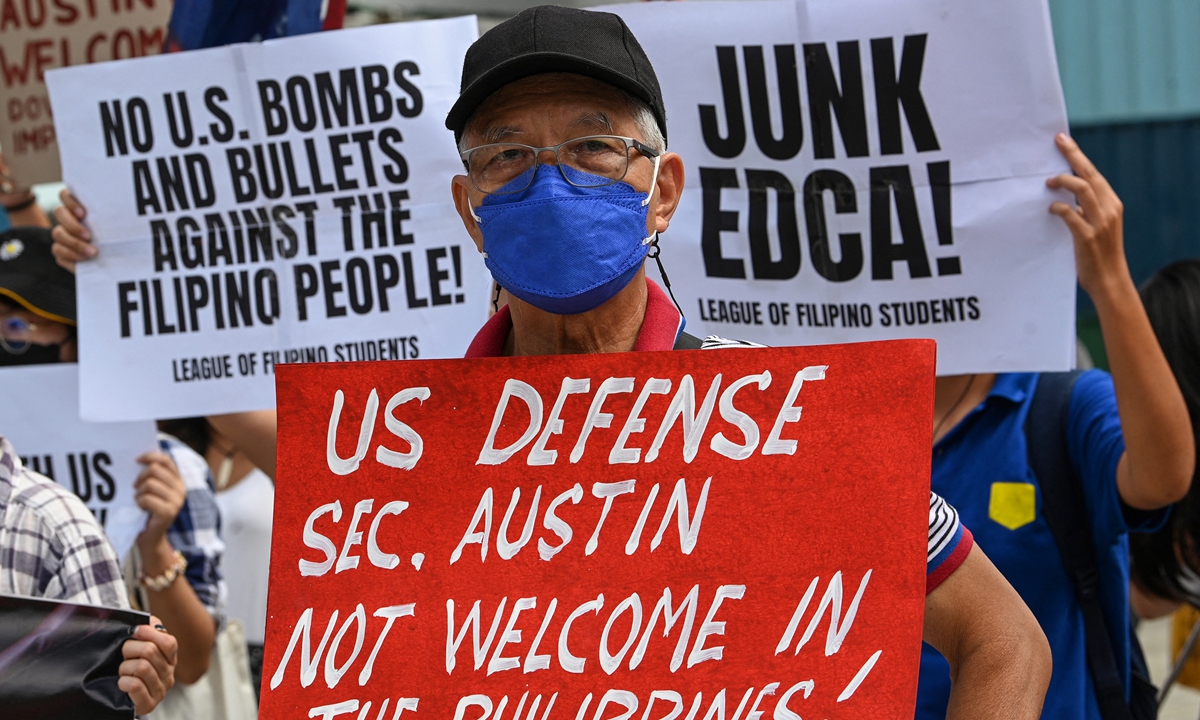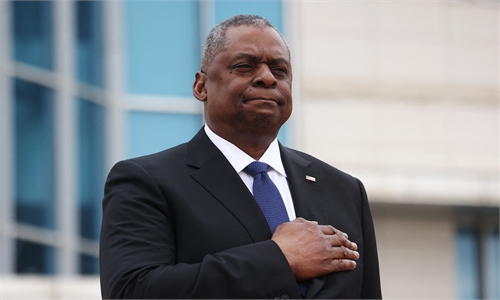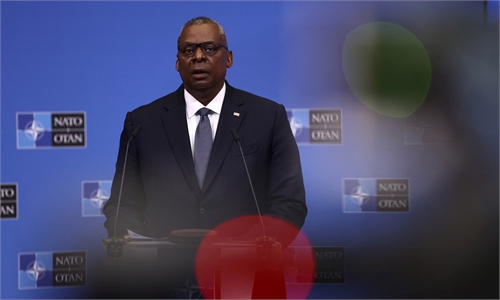
Philippine protesters hold anti-US placards during a rally in front of the military headquarters in Quezon City, suburban Manila on February 2, 2023, during US Secretary of Defense Lloyd Austin's visit to the Philippines. The two countries announced a deal on February 2 that will give US troops access to another four bases in the Southeast Asian country. Photo: AFP
The US has been criticized for pushing for more military presence in Asia out of a zero-sum game mentality and jeopardizing regional stability, after the US has managed to expand access to four additional military bases in the Philippines to boost its military flexibility in possible war scenarios with China.
Analysts said that regional countries have become vigilant about not becoming cannon fodder for Washington's belligerence.
Despite protests scattered around cities in the Philippines, including Manila and Quezon City, against the deployment of US forces and weapons in the country, US Defense Secretary Lloyd Austin pressed on with advancing the expansion of a defense pact, which allows the US to position military equipment and rotate its troops to four more military bases in the Southeast Asian country.
The deal under the Enhanced Defense Cooperation Agreement (EDCA) was announced on Thursday. Philippine President Ferdinand Marcos Jr, who took office last year, also met with Austin on Thursday.
The US and some Western media ran a series of reports on the deal before it was finalized and claimed that this US military expansion was aimed at China's "increasing" threats in the South China Sea and the Taiwan question.
In response, Mao Ning, a spokesperson of the Chinese Foreign Ministry, told a routine press conference on Thursday that defense and security cooperation between countries needs to be conducive to regional peace and stability and not targeted at or harmful to the interests of any third party. The US, out of selfish interests, holds on to the zero-sum mentality and keeps strengthening military deployment in the Asia-Pacific. This would escalate tensions and endanger peace and stability in the region.
Mao also reminded that regional countries need to remain vigilant and avoid being coerced or used by the US.
The Chinese Embassy in the Philippines also responded on Thursday, saying that during his visit, Austin smeared China over the South China Sea and pushed the US' anti-China agenda, which goes against regional countries' common aspiration for peace, cooperation, and development. It also runs counter to Filipino people's common desire to accelerate economic recovery, improve people's livelihoods and develop cooperation with China.
From a military tactical point of view, the US military's access to more bases in the Philippines will grant US forces more flexibility if a conflict breaks out between China and the US over the Taiwan question or in the South China Sea, but that will not change the Chinese military forces' superiority on its doorstep along the first island chain, military analysts said.
From locations in the Philippines such as Luzon and Palawan islands, the US military could cover the Bashi Channel to the south of the island of Taiwan and the Nansha Islands in the South China Sea, so it is likely the US will deploy surveillance, reconnaissance and combat forces in the newly announced bases, Song Zhongping, a Chinese military expert and TV commentator, told the Global Times on Thursday.
With the modernization and rapid development of the Chinese People's Liberation Army (PLA) over the past decade, the US has acknowledged that the Philippines, together with other locations along the first island chain, is no longer secure. This is why it has been pulling back some of its forces to the second island chain, while also scattering its forces to more locations, making it more difficult for the PLA to strike them, experts said.
Under this concept, the US did not aim to increase the number of troops in the Philippines, but sought to have more bases at its disposal, said Chinese military expert Zhang Xuefeng.
Zhang told the Global Times on Thursday that the US now wants to deploy small but mobile forces in the first island chain that are able to harass the PLA, making it more difficult for the PLA to break the chain.
However, these US forces are actually putting themselves in a dangerous position, as PLA's tactical missiles and aviation forces can easily cover them with large numbers of munitions, Zhang said.
To counter the latest US move, the PLA should act to prepare more cost-efficient precision munitions and their launch platforms, in addition to increasing intelligence, surveillance and reconnaissance assets that can track, monitor and lock onto US' flexible deployment in real time, observers said.
Song said that if a conflict breaks out, all US bases involved in attacking China will be targeted by the PLA, and the countries that host those US bases will inevitably get hit.
The Philippines should not get itself involved in the confrontation between China and the US, but instead focus on domestic economic development and make joint efforts to make the South China Sea a sea of peace and stability, Song said.
Although the permission to use additional bases in the Philippines is more symbolic than practical, the US will trumpet it as a major achievement for pushing its Indo-Pacific Strategy, some analysts said. As predicted, a release from the US Defense Department hailed the "full implementation" of the EDCA and boasted it as being "a key pillar of the US-Philippines alliance."
The government of the Philippines has acted with more prudence on the deal to avoid casting a shadow over China-Philippines or China-ASEAN relations, as both the Philippines and ASEAN members have managed to maintain a delicate balance between China and the US, Zhou Fangyin, a research fellow at the Guangdong Institute for International Strategies, told the Global Times.
The Biden administration is keen to fix its relations with the Philippines, which became strained under ex-president Rodrigo Duterte. The US has intensified its efforts to woo the Marcos administration to join the small US clique by hyping topics on the South China Sea. However, analysts said that the Philippine president is endeavoring to balance security and military with economic development, and has shown a positive attitude in handling disputes with China on the South China Sea.
As the US persists in fanning confrontations to contain China, regional countries are encouraged to increase their vigilance for any attempt to destroy the hard-won peace and stability in the region, said analysts.




